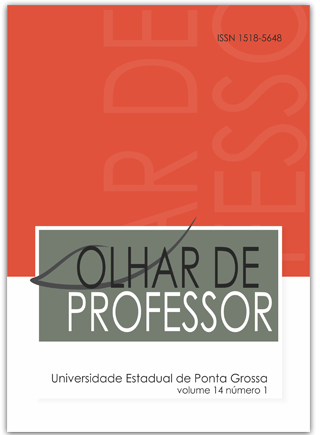A educação escolar das infâncias na sociedade midiática: desafios para a prática pedagógica. Doi: 10.5212/OlharProfr.v.14i1.0004
Conteúdo do artigo principal
Resumo
Neste artigo comungamos com outros pesquisadores que reivindicam a urgência de uma educação com, para e por meio de mídias na escola, sobretudo quando desenvolvida por meio de uma Pedagogiada Comunicação que, a partir da prática docente mediadora dos professores, seja potencializadora e possibilitadora de uma prática educativa desta natureza. Para ancorar nossas reflexões, tomamos por referência a formação e as práticas pedagógicas realizadas na educação infantil, pois acreditamos que a implementação de uma ação educativa com, para e por meio de mídias já na Educação Infantil pode proporcionar às crianças, em primeiro lugar, um processo de ensino-aprendizagem formal que viabilize e desenvolva um consumo mais vivencial, sensível e reflexivo daquilo que veem na tela da tevê; e, em segundo, que ofereça aos pequenos processos educativos socializadores que respeitem e valorizem sua condição de sujeitos sociais agentes, tornando possível, assim, a participação tanto em seu processo educativo como na prática social.
Downloads
Detalhes do artigo
Autores que publicam nesta revista concordam com os seguintes termos:
a) Os autores mantêm os direitos autorais e concedem à revista o direito de primeira publicação, com o trabalho simultaneamente licenciado sob a Creative Commons Attribution License Atribuição 4.0 Internacional (CC BY 4.0) que permite o compartilhamento do trabalho com reconhecimento da sua autoria e publicação inicial nesta revista.
b) Os autores são autorizados a assinarem contratos adicionais, separadamente, para distribuição não exclusiva da versão publicada nesta revista (por exemplo, em repositórios institucionais ou capítulos de livros), com reconhecimento da sua autoria e publicação inicial nesta revista).
c) Os autores são estimulados a publicar e distribuir a versão onlline do artigo (por exemplo, em repositórios institucionais ou em sua página pessoal), considerando que isso pode gerar alterações produtivas, bem como aumentar o impacto e as citações do artigo publicado.
d) Esta revista proporciona acesso público a todo o seu conteúdo, uma vez que isso permite uma maior visibilidade e alcance dos artigos e resenhas publicados. Para maiores informações sobre esta abordagem, visite Public Knowledge Project, projeto que desenvolveu este sistema para melhorar a qualidade acadêmica e pública da pesquisa, distribuindo o OJS assim como outros softwares de apoio ao sistema de publicação de acesso público a fontes acadêmicas.
e) Os nomes e endereços de e-mail neste site serão usados exclusivamente para os propósitos da revista, não estando disponíveis para outros fins.
______________

Este obra está licenciado com uma Licença Creative Commons Atribuição 4.0 Internacional.





